Instrumental Invasion, 3/29/23: Third Anniversary March 30, 2023
Posted by Mike C. in Airchecks, Audio, Internet, Jazz, Media, Music, Personal, Radio, Weather.add a comment

The March 29 Instrumental Invasion on WCWP marked three years since my Wednesday night premiere! The show was recorded entirely on February 1. Pickups were recorded on the 1st, 2nd, and 9th (after learning Burt Bacharach had died). Thus, I’d recorded three shows in four days, my fastest output since recording the first six shows on consecutive days in March 2020.
The playlist was created on January 21, a day after the two prior shows (March 15, March 22), and annotated on January 25 and 26. The talk break script was drafted January 28.
I padded out the last talk break of the show with more information regarding the midnight sun while back-selling the Ahmad Jamal version of “Midnight Sun.” With 33 seconds left to fill, I redid the third segment’s talk breaks at a slower pace and swapped the short Jeff Kroll liner in the first segment for the longer “smile, Mike!” liner. I reinstated the short liner a week later to compensate for the Burt Bacharach acknowledgment.
Following in the tradition of anniversary shows past (first, second), the hour 1 format was 1984 and earlier – with songs from 1967 to ’83 – and hour 2’s format was ’85 to ’97 – with songs running the gamut, just like last year.
The underlying theme was songs with April in the title, seeing how the Wednesday night premiere aired April 1, 2020. It was the second week in a row with a version of “April Fools” by John Favicchia.
Click here to download this week’s scoped aircheck or listen below:
8:35 AM UPDATE: Whoops! I left in an error. April 1 is Saturday, not Friday.
Audiobooking 8 March 24, 2023
Posted by Mike C. in Animation, Audiobooks, Basketball, Comedy, Film, Game Shows, Golf, History, Media, Music, News, Personal, Podcast, Politics, Radio, Rock, Sports, Technology, Theatre, TV, Video Games.add a comment

It’s time for the annual “audiobooking” post. Most are visible in the thumbnail, but here are all the audiobooks (with links) that I’ve listened to on Audible since post #7 last year:
- Thanks a Lot, Mr. Kibblewhite: My Story by Roger Daltrey
- All About Me! My Remarkable Life in Show Business by Mel Brooks
- The Kid Stays in the Picture by Robert Evans (1930-2019)
- Killing the Killers: The Secret War Against Terrorists by Bill O’Reilly and Martin Dugard (read by Robert Petkoff)
- I Am C-3PO: The Inside Story by Anthony Daniels with J.J. Abrams (foreword written and read by J.J., otherwise read by Anthony; “th” pronounced like a “t”)
- Out of the Corner: A Memoir by Jennifer Grey
- Directed by James Burrows: Five Decades of Stories from the Legendary Director of Taxi, Cheers, Frasier, Friends, Will & Grace, and More; written by James Burrows with Eddy Friedfeld (foreword by Glen and Les Charles, read by Danny Campbell; otherwise read by Jimmy) – previously referenced on 9/14/22 Instrumental Invasion
- Yours Cruelly, Elvira: Memoirs of the Mistress of the Dark by Cassandra Peterson (“cassahndra”)
- Priceless Memories by Bob Barker with Digby Diehl (read by Bob; credits read by Robert Petkoff!) – I already have this as a CD set, but I wanted the Audible treatment
- Cheech is Not My Real Name…But Don’t Call Me Chong! by Cheech Marin
- May You Live in Interesting Times: A Memoir by Laraine Newman – previously referenced on 12/7/22 Instrumental Invasion
- Laugh Lines: My Life Helping Funny People Be Funnier by Alan Zweibel (foreword written and read by Billy Crystal, otherwise read by Alan)
- Hello, Molly! A Memoir by Molly Shannon with Sean Wilsey (read by Molly)
- I’m Still a 10-Year-Old Boy: Revised and Edited by Nancy Cartwright – includes audio clips, notably of voice over lessons with Daws Butler
- Wish It Lasted Forever: Life with the Larry Bird Celtics by Dan Shaughnessy – Dan did impressions of Bird and various players when reading their quotes. His Bill Walton impression inspired me to pick up…
- Back from the Dead: Searching for the Sound, Shining the Light, and Throwing It Down by Bill Walton
- Killing the Legends: The Lethal Danger of Celebrity by Bill O’Reilly and Martin Dugard (read by Robert Petkoff) – chronicles the lives and final days of Elvis Presley, John Lennon, and Muhammad Ali
- Waxing On: The Karate Kid and Me by Ralph Macchio
- Where’s My Fortunate Cookie? My Psychic, Psurrealistic Pstory by The Firesign Theatre‘s Phil Proctor with Brad Schreiber (read by Phil) – includes clips from various Firesign recordings, updates exclusive to the audiobook via Phil’s podcast
- Friends, Lovers, and the Big Terrible Thing by Matthew Perry
- I Must Say: My Humble Life as a Comedy Legend by Martin Short – includes Marty as his many characters, rendition of his Christmas party song with Marc Shaiman
- A Life in Parts by Brian Cranston
- The Gospel According to Luke by Steve Lukather with Paul Rees (read by Luke with exclusive ad-libs)
- Face the Music: A Life Exposed by Paul Stanley
- I got halfway through an audiobook by a New Jersey-based musician and actor who was part of a long-running HBO drama. Then, the author launched into a long political dissertation. I returned my credit and moved on to…
- Disrupting the Game: From the Bronx to the Top of Nintendo by Reggie Fils-Aimé (“feese-ah-may”) – main audiobook is followed by off-the-cuff conversion with video game journalist Geoff Keighley
- I only lasted five minutes or so on an audiobook about the media until it became clear this would mostly contain interview excerpts from the author’s podcast. So, I returned that credit.
- Straight Shooter: A Memoir of Second Chances and First Takes by Stephen A. Smith
- So Help Me Golf: Why We Love the Game by Rick Reilly – a collection of golf-themed essays
That’s a total of 27 audiobooks (two co-written by O’Reilly, one wholly by Reilly), plus two returns. Everything from I’m a Still a 10-Year-Old Boy through Face the Music was purchased in October while Audible steeply discounted their catalog. Since then, I only use Audible credits on audiobooks over $14.95, the monthly membership fee. Of course, if I buy three credits for $35.88, then I’ll buy anything over $11.96.
Next year’s “audiobooking” post will be the ninth overall, but the tenth anniversary. Until then, happy listening.
5/26/24 UPDATE: I can no longer commit time to these “Audiobooking” blog posts. So, last year’s eighth post is the final post. Thank you for following my journey through audiobooks over the past decade.
Instrumental Invasion, 3/22/23 March 23, 2023
Posted by Mike C. in Airchecks, Audio, Football, History, Internet, Jazz, Media, Music, Personal, Radio, Sports, TV.add a comment
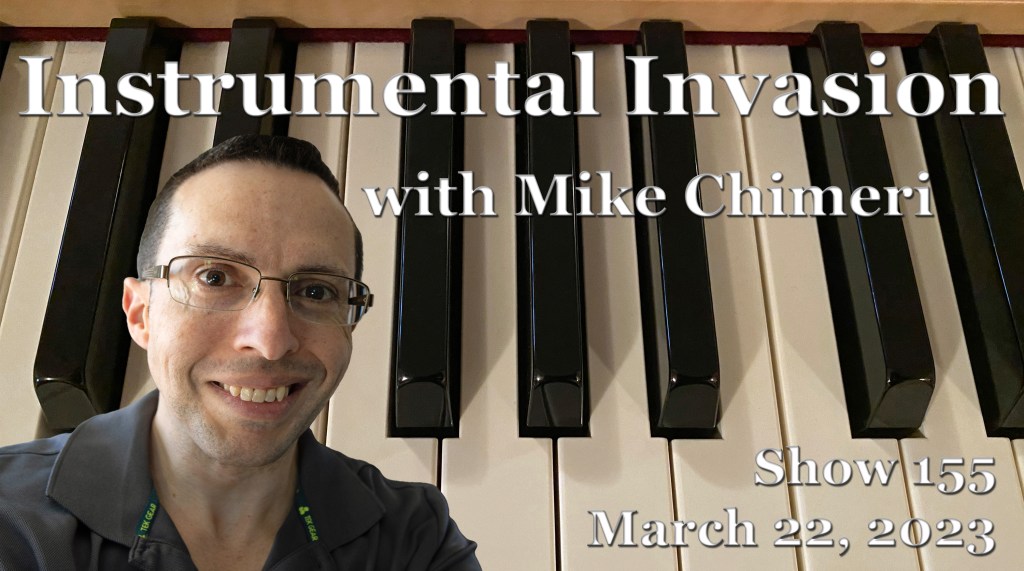
The March 22 Instrumental Invasion on WCWP was recorded one hour per day on January 30 (after completing last week’s show) and 31. Pickups were recorded on the 31st and February 1.
The playlist was created alongside last week’s on January 20, annotations followed on the 25th, and the talk break script was drafted on the 27th.
Key January 31 pickups were for the Gregg Karukas song I played. I didn’t realize my mistake until putting “Soul Secrets” into Adobe Audition and seeing its shorter duration. “Secret Smile” was the song I wanted, and it had radically different credits. So, I fixed the annotations and script. I also recycled Jeff Kroll’s “smile, Mike!” from the earlier liner. That liner led into “Behind the Rain” by Herb Alpert. This time, I didn’t even bother guessing who played what, but I challenge you to listen and not think of slow-motion NFL highlights narrated by John Facenda.
Another notable pickup padded out hour 2’s second segment, ad-libbing January 20 tidbits that I left in the annotations, but didn’t put back in the script.
This was only the fifth show in 155 without a song by David Benoit. Like the other four times, he will be back next week.
Click here to download this week’s scoped aircheck or listen below:
Instrumental Invasion, 3/15/23 March 16, 2023
Posted by Mike C. in Airchecks, Animation, Audio, Comedy, Internet, Jazz, Media, Music, Personal, Radio, TV, Video, Weather.add a comment
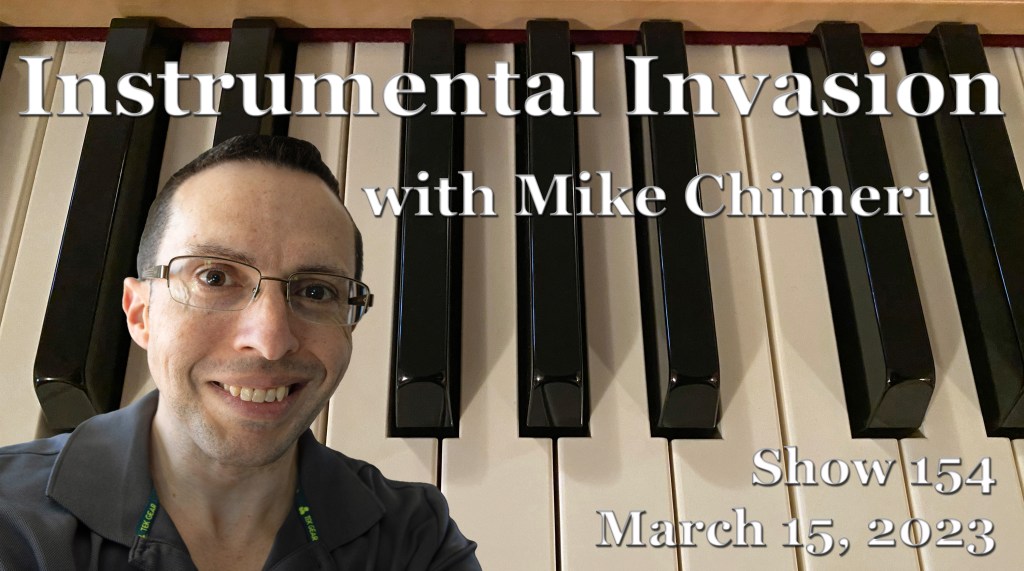
The March 15 Instrumental Invasion on WCWP was recorded one hour per day on January 29 and 30, with pickups on the 30th. After hearing the filtered audio over the air on January 25, I abandoned the technique. The two locations I record at have unique audio quality, and there’s no point in trying for a uniform sound.
The playlists for this week and next were created on January 20. This week’s annotations came on the 24th and 25th, and the talk break script was drafted on the 26th and 27th.
I led the show with Quincy Jones’s “Killer Joe” arrangement to make up for my blunder on January 18. I superstitiously neglected to acknowledge Q’s 90th birthday on Tuesday; the perils of recording in advance. I did, however, acknowledge the January blunder while back-selling “Chicken Joe” by Joe McBride. The talk-up for that song referenced Chicken Boo from Animaniacs. (I had no idea season three of the Hulu reboot was to launch on February 17.) My cluck for the tease was inspired by Jay Sherman’s (Jon Lovitz) cluck in The Critic series finale.
I’d been meaning to play “Free” by Beth Michaels ever since TWC Classics posted its appearance in a [glitchy] November 27, 1994, local forecast:
During the annotation process, “Metro Blue” by Richard Elliot replaced Kenny G‘s cover of “The Way We Were.” Wikipedia’s entry for the album it appears on lacked concise credits, as did all other online resources. Forgetting I had the CD at home, I hastily searched for a replacement, settling on “Metro Blue.” The Metro Blue record label tidbit I had in mind for “Coastline” next week was moved up a week.
I took an educated guess on Herb Alpert‘s “Rotation” personnel.
The playlist included three retreads:
- “Lake Shore Drive” by Brian Simpson (April 8, 2020)
- “Space-Time” by The Jeff Lorber Fusion (August 25, 2021)
- “Nightingales & Fairy Tales” by Lisa Hilton (September 29, 2021)
Click here to download this week’s scoped aircheck or listen below:
Instrumental Invasion, 3/8/23 March 9, 2023
Posted by Mike C. in Airchecks, Animation, Audio, Comedy, Comics, Computer, History, Internet, Jazz, Media, Music, Personal, Photography, Radio, Technology, TV, VHS, Video, Video Games.add a comment

Since there’s much to discuss and many photos and videos, I’ll post the scoped aircheck up here (and below) instead of at the end:
The March 8 Instrumental Invasion on WCWP was recorded from January 14 to 16: the first hour on the 14th, the next two segments on the 15th, and the last on the 16th. Pickups were recorded that day and the next (January 17).
Due to a facility issue at the Abrams Communication Center, WCWP activity was not allowed the day this show aired. Station manager Pete Bellotti informed me the show would air at 7PM and 9PM since there couldn’t be a live edition of The Rock Show. The above scope is from the 7PM broadcast.
The playlist was created and mostly annotated on January 11. The rest of the annotations came on the 12th, followed by the talk break script draft that carried into the 13th. A timing error in the first segment meant I had to make up a 72-second surplus. I successfully made up that time without having to remix segments.
Five songs in this show have appeared in prior shows:
- “Feel Like Making Love” by Bob James (1/20/21)
- “Freda” by Nelson Rangell (9/9/20)
- “When We Dance” by Ken Navarro (4/22/20)
- “And Now This” by Paul Taylor (1/5/22)
- “Ride With Me” by JJ Sansaverino (8/24/22)
“Freda” was preceded by David Benoit‘s arrangement of “Frieda with the Naturally Curly Hair” from Here’s to You, Charlie Brown: 50 Great Years! I had yet to see the special that gave David’s CD its name, but watched a few days after completing production. Here it is:
A chance viewing of a video that showed the differences between the original and subsequent airings of A Charlie Brown Christmas got the ball rolling on Peanuts documentaries and specials. The first video YouTube recommended was the documentary A Boy Named Charlie Brown, not to be confused with the later film:
The second video chronologically was the third recommended to me: Happy Anniversary, Charlie Brown.
The second special I watched was It’s Your 20th Television Anniversary, Charlie Brown. (I originally omitted the “television” part, correcting the error in my January 17 pickup.)
The last special I watched on YouTube before working on this show was You Don’t Look 40, Charlie Brown. This special coincided with the unrelated CD Happy Anniversary, Charlie Brown! David Benoit appears in a “Linus and Lucy” music video, concluding with his anniversary wishes to Good Ol’ Charlie Brown.
After Here’s to You, I watched the CBS News special Good Grief, Charlie Brown: A Tribute to Charles Schulz, hosted by Walter Cronkite:
And just this Sunday, the following ran on CBS Sunday Morning (4/12 UPDATE: CBS removed the YouTube version, so here it is via Facebook):
Lee Cowan’s report featured Schulz’s widow Jean and Pearls Before Swine cartoonist Stephan Pastis (first name pronounced like Stephen Curry).
As my Facebook friends and Instagram followers know, I obsessively archived Brian Simpson‘s Closer Still CD for posterity since it’s rare for anyone to find the real thing. (You can’t even find it on eBay!) I won’t share my WAV and MP3 rips from the CD since you can buy and stream the tracks digitally from places like Amazon Music, Apple Music, and Spotify. I will, however, share my camera photos and flatbed scans. Photos first:



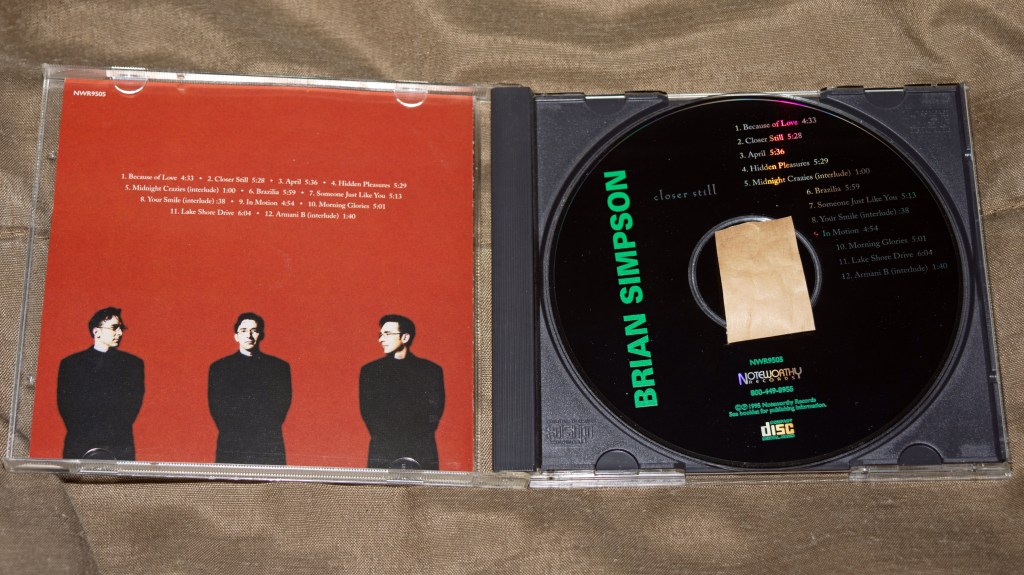
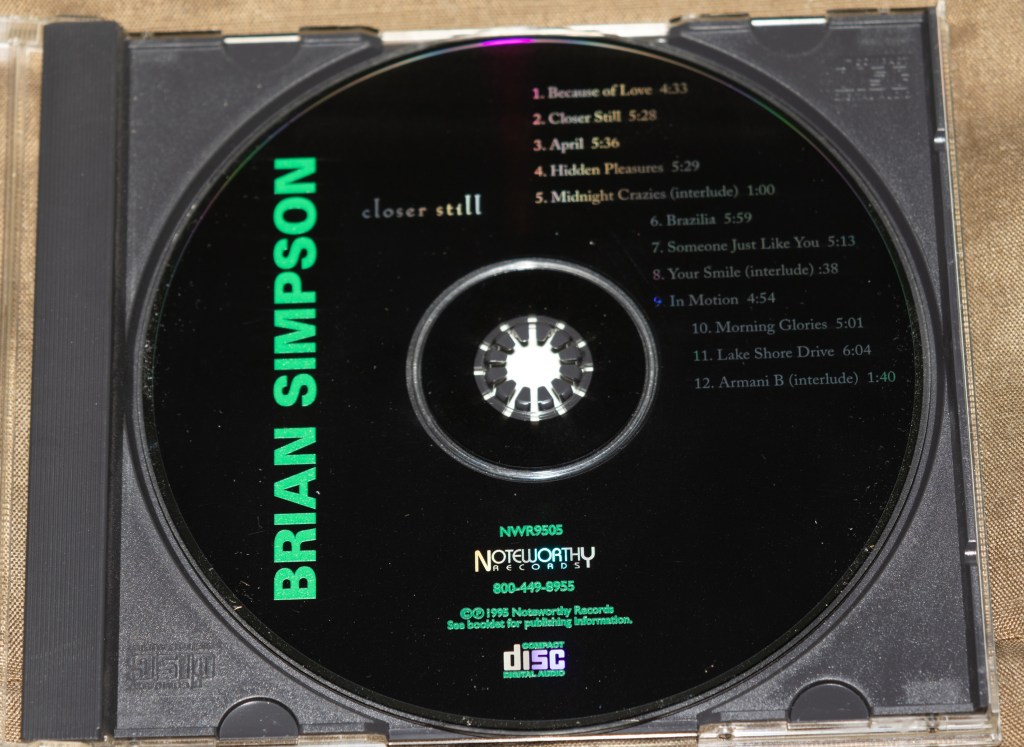

Scans:
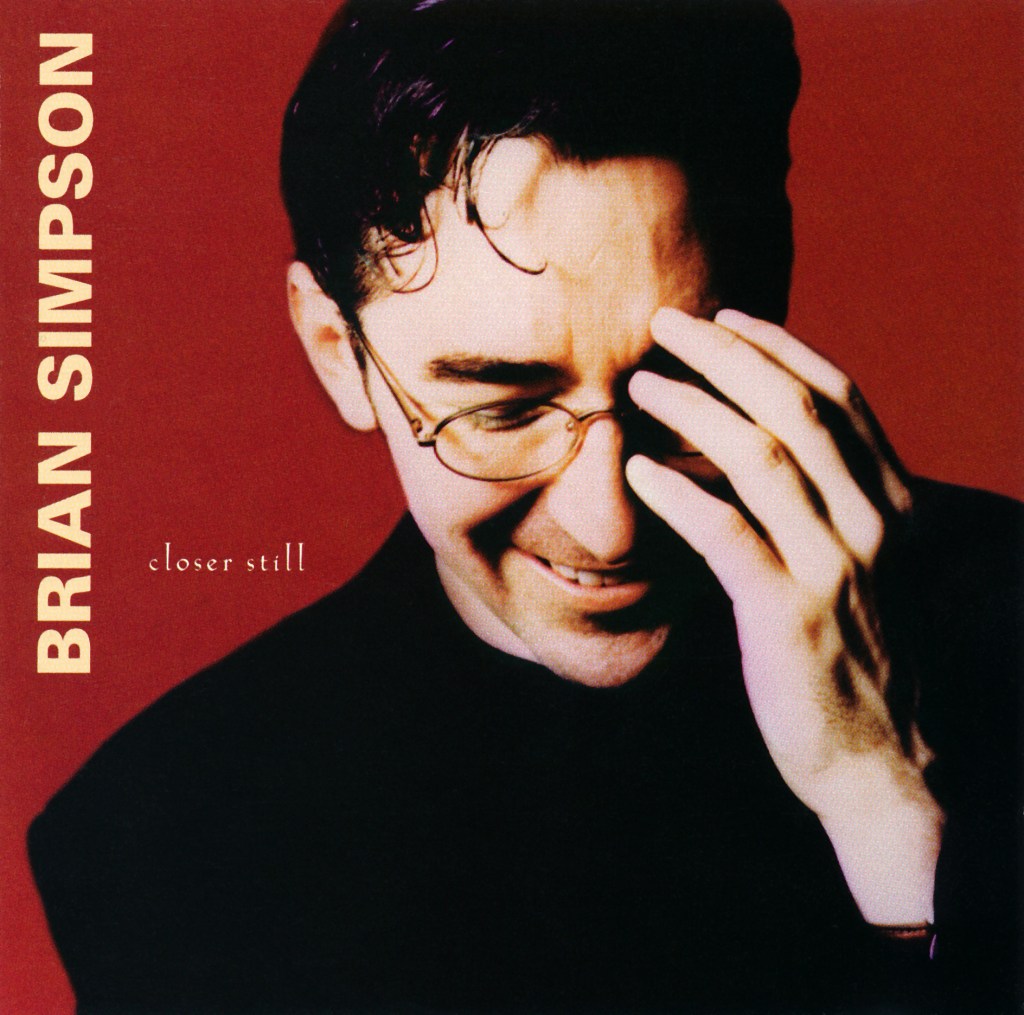


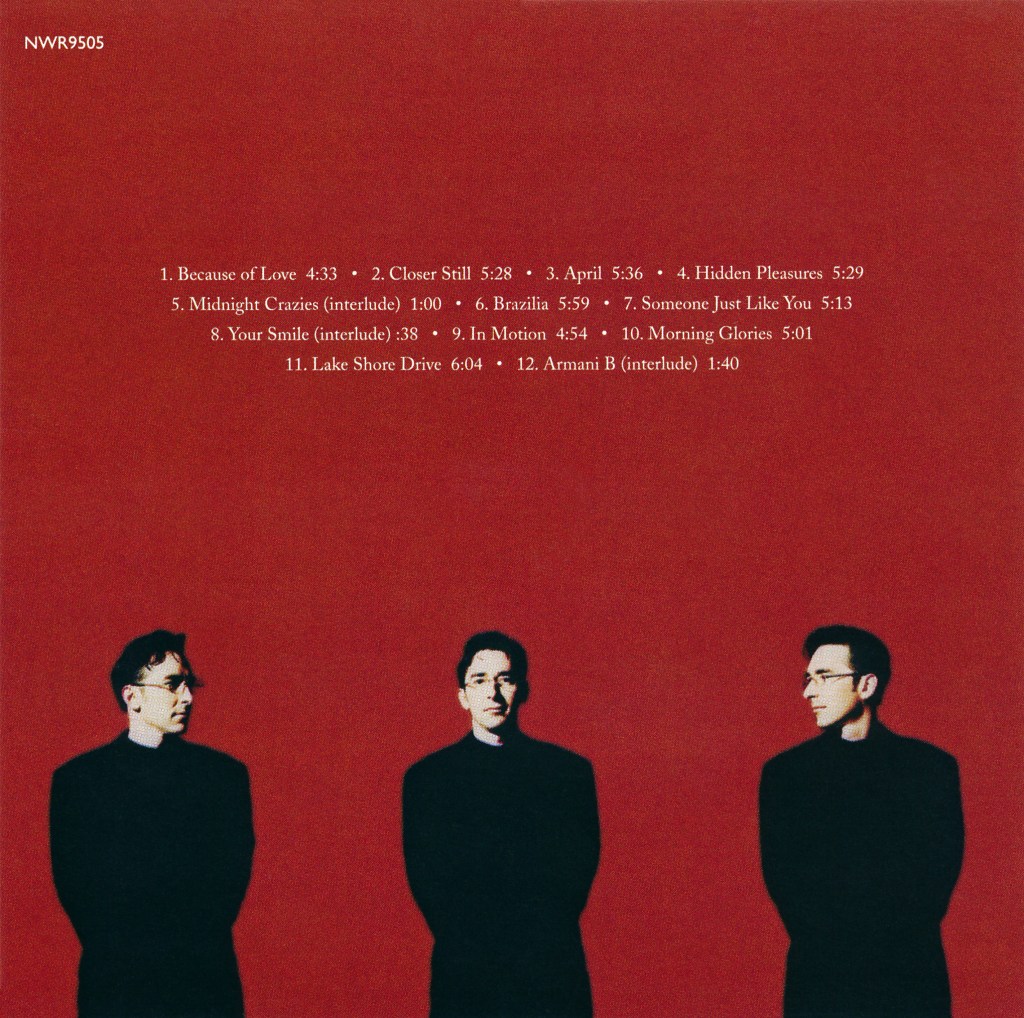

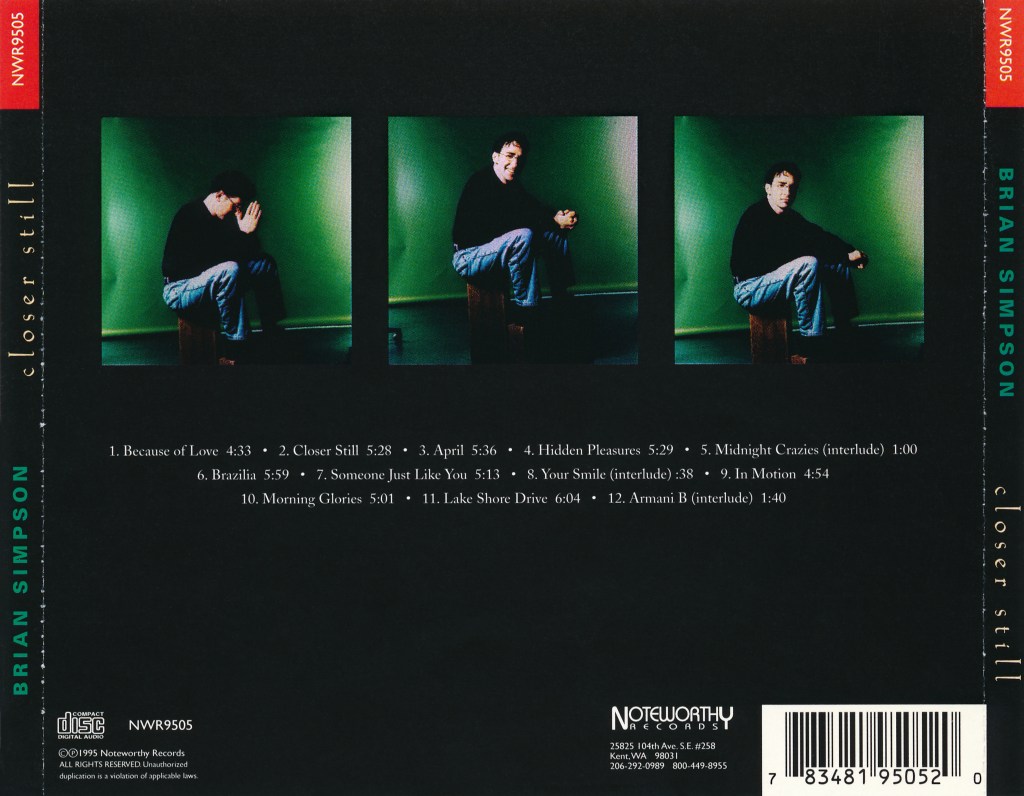
“Hidden Pleasures” (track 4) was the centerpiece of my three Brians segment (two Brians, one Bryan). The talk break that followed paid homage to two video game-centric content creators: Game Dave and Metal Jesus, with a reference to Frank Cifaldi and the Video Game History Foundation for good measure. Metal Jesus occasionally posts “hidden gems” videos, highlighting overlooked video games. Here’s a marathon of six episodes he did on Wii hidden gems:
Thank you for reading to the end of this post. I’ll return to the regular show recap format next week.
My city pop discovery (and reacquaintance with Garfield and Friends) March 5, 2023
Posted by Mike C. in Animation, City Pop, Comedy, Comics, Film, Game Shows, Health, Internet, Jazz, Media, Music, Personal, Phone, Pop, Radio, Technology, Travel, TV, Video, Video Games, Weather.2 comments

NOTE 1: This is also a Garfield and Friends story with several montages among the city pop material. Those montages led me to city pop.
NOTE 2: I consulted my computer audio recordings of the Garfield and Friends DVDs to ensure the video embed caption quotes are verbatim.
NOTE 3: I even spend a paragraph on The Weather Channel tribute site TWC Classics, a simulator that re-creates the old local forecasts, and recently departed announcer Dan Chandler who lent his narration to the sim.
Nearly 50 years ago, Japan’s economy was booming and a new leisure class developed. That leisure class begat a new Japanese pop music genre, borrowing elements of various Western music genres. They called it city pop. What began in the 1970s, peaked in popularity in the ’80s, then fell out of the Japanese mainstream.
City pop found a new Western audience in the 2010s thanks to blog posts like mine (but earlier), Japanese reissues of the genre’s albums, and YouTube uploads of the albums’ tracks. From a 2023 perspective, I give YouTube most of the credit. Today, it is the best city pop recruitment tool.
The rest of this post is about how I discovered city pop and recounts my first nine days as a fan. If you want to read more about the genre and its resurgence, I recommend Cat Zhang’s 2021 Pitchfork article and Wikipedia’s city pop entry.
On February 19, YouTube recommended a video with random clips from my favorite cartoon series, Garfield and Friends:
Jim Davis created the Garfield comic strip and CBS TV specials, but Mark Evanier (with Sharman DiVono for three seasons) spun comedy gold on CBS Saturday mornings from 1988 to 1994 (the last rerun aired in ’95). I can quote parts of episodes or even whole episodes. So, when watching the above clips, I knew what happened next.
The next Garfield and Friends clip in my recommendations came on February 20:
The evening of February 21 was my city pop entry point, but we’re not there yet. The prelude to the entry was this:
Full disclosure: I met Jim Davis at a signing in March 1995, but I was too shy and just had him sign a sketch. And I interviewed Jon Arbuckle voice actor Thom Huge (HUE-ghee) three times for The Mike Chimeri Show. (In retrospect, I would have held off on the first interview until his voice was back to normal.)
The Jon Arbuckle montage led YouTube to recommend this:
Whoa! What is that song that sounds vaguely like “Burnin’ Up the Carnival” by Joe Sample (from Voices in the Rain)? I scrolled down and saw the song was “4:00 A.M.” by Taeko Onuki (or Ohnuki). I searched Google on my iPhone and the Taeko’s Wikipedia entry (linked in the previous sentence) and found the song. That prompted the YouTube app where I heard the whole thing:
Whoa again, it appeared on an album with the last name of a few of my friends, but with an extra N. Lyrics are here.
1:30 PM UPDATE: A member of the My Life in Gaming Discord server told me the album title was part of Taeko’s fascination with French media, which I confirmed after a Google Search yielded this 2017 interview. Still, Mignonne is one letter off from my friends of Italian descent.
3:10 PM UPDATE: I just finished reading the interview linked in the prior update. It was an interesting read, but I was disappointed to learn Taeko did not like Mignonne because of what transpired during production. The resulting disenchantment, and poor sales, made her take a two-year hiatus from the music industry. Anyway, back to the good stuff.
Taeko’s Wikipedia entry led me to the one on city pop. That’s what I heard and I wanted more.
I could not stop listening to “4:00 A.M.” Ironically, it kept me up past midnight, but not as late as 4AM. I was up at 4AM on March 4 when I drafted this blog post thanks to a period of strong easterly winds that buffeted my bedroom window. The song’s refrain may sound vaguely like the later “Burnin’ Up the Carnival,” but the song otherwise had more in common with the works of Bob James and Grover Washington Jr. The line “ima o” was phrased like “that’s the time” in “Feel Like Makin’ Love” by Roberta Flack, which Bob played on and then covered. The guitar solo on the ending breakdown sounded like it came from Eric Gale‘s hands. (It was from Tsunehide Matsuki‘s hands.) I have repeatedly imagined Grover Washington himself covering “4:00 A.M.” on alto saxophone, soloing (improvising) from the last refrain, through the breakdown, all the way to the end.
I should probably acknowledge that I am on the high-functioning end of the autism spectrum, formerly known as Asperger Syndrome. That probably explains my intense focus on one thing or another, and attention to detail.
I was busy with radio show production on February 22, but “4:00 A.M.” was in the back of my mind and I was intent on extracting the audio and assigning the WAV file to a vintage Weather Channel local forecast flavor in my WeatherStar 4000 simulator. Now, I could hear all but the last 36 seconds with the current conditions and forecast, peppered with Dan Chandler’s re-created narrations. (I was in touch with Dan for a few weeks midway through my tenure at WGBB, and he even called in while I was playing a song. I didn’t put him on, but relayed what we talked about, including “reading the sports pages” as he listened to the live stream. After writing that sentence, I’m sorry to learn that he passed away on February 7 [obituary].) The simulator was already populated by music cues from The Price is Right and adjacent Goodson–Todman game shows. See the February 15 Instrumental Invasion recap for more on that obsession.
While my “4:00 A.M.” obsession continued, YouTube had more city pop recommendations, including a modern music video for Mariya Takeuchi‘s “Plastic Love“:
Oh, and another Jon Arbuckle montage:
As the “Plastic Love” video wound down, I pretended to be Dan Ingram back-selling the song, quipping that it was better than polyurethane love.
My vocal city pop discoveries halted for the next few days when I found a city pop creation befitting my love of instrumental music: jazz fusion supergroup Casiopea!
First, I found “Midnight Rendezvous“:
Then, “Eyes of the Mind” before the “the” was added:
Groups like Casiopea and T-Square (formerly The Square) have influenced generations of video game music composers.
I woke up on February 23 after a full night’s sleep and was greeted with two more Jon Arbuckle videos:
As I listened to my radio show aircheck from the night before, I began extracting audio from whatever Casiopea albums were on YouTube (mostly via their “topics” channel), provided the cover art available online was clear and at least 1500×1500 pixels. If AI upscaling in Adobe Photoshop yielded poor results, I’d buy the CD myself and scan the artwork. That’s what I did for Flowers (1996), but I bought Euphony (1988) because it wasn’t on YouTube. I will eventually buy the actual CDs, but given the inflated import prices, collection take a while. Here’s what I do have:
- Casiopea (5/25/79) (Alfa)
- Super Flight (11/25/79) (Alfa)
- Thunder Live (4/21/80) (Alfa)
- Make Up City (11/21/80) (Alfa)
- Eyes of the Mind (4/21/81) (Alfa) – featuring the aforementioned Bob James
- Cross Point (10/21/81) (Alfa)
- Mint Jams (5/21/82) (Alfa)
- 4×4 Four by Four (12/16/82) (Alfa)
- Photographs (4/23/83) (Alfa)
- Jive Jive (11/30/83) (Alfa)
- The Soundgraphy (4/25/84) (compilation album) (Alfa) – I have the title track, the lone original recording
- Down Upbeat (10/25/84) (Alfa)
- Halle (9/10/85) (Alfa)
- Casiopea Live (9/25/85) (Alfa)
- Sun Sun (9/10/86) (Alfa)
- Euphony (4/25/88) (Polydor/Aura) – the CD reissue I have includes “Halle” from Casiopea Perfect Live II (7/10/87) as a bonus track
- Full Colors (5/25/91) (Pioneer)
- Dramatic (5/21/93) (Alfa)
- Answers (5/25/94) (Alfa)
- Asian Dreamer (12/16/94) (Pony Canyon)
- Freshness (5/19/95) (Pony Canyon)
- Flowers (9/20/96) (Pony Canyon)
- Light and Shadows (9/3/97) (Pony Canyon)
- Material (5/19/99) (Pony Canyon)
- Ta•Ma•Te Box (11/20/13) (Hats Unlimited) (CD tracks only)
- A•So•Bo (4/22/15) (Hats Unlimited) (CD tracks only)
- New Topics (10/12/22) (Hats Unlimited)
I’m still working my way through the albums chronologically in my spare time. Flowers is gradually on its way from a Japan Discogs markeplace seller, so I jumped from Freshness to Light and Shadows. That’s where I am as of publication on March 5. (I got in eight hours of sleep the night before.)
The last item in this post’s Casiopea segment is T2norway‘s video profile of them, preceded by his city pop story:
The night of February 23, YouTube recommended two more Garfield and Friends videos. One was yet another montage:
And the other was a series review by Nostalgia Critic, played by Doug Walker (who was born the same day as me!):
I was let down by his critiques of certain characters and the animation style, not to mention his disdain for U.S. Acres. Nonetheless, I respect his dissent.
My city pop discoveries resumed on the night of February 25, related to “Plastic Love.” Leading off, a Super Famicom/Nintendo rendition:
That was followed by the infamous long version of the Mariya Takeuchi original (lyrics):
(As of March 13, the video was taken down. In the long version, one verse repeated and the ending chorus was extended, exemplified below.)
Since I was watching in a web browser, I saw recommendations on the right side of the tab. The one that caught me eye was an English version of “Plastic Love”:
The singer-songwriter was Caitlin Myers, also a voice actress with a focus in anime and video games. She has two YouTube channels: one in her name and one called Interlunium. I was unaware of the scope of her work as I watched this first video. (3/31 UPDATE 1: Interlunium is a virtual idol group where Caitlin portrays Junko.) (3/31 UPDATE 2: Caitlin’s version of “Plastic Love” was reworked with original instrumentation and new vocals for her 2021 compilation, City Poppin’.)
More city pop discoveries came way on February 26. Figuratively waiting at the door to this new day was “Mayonaka no Door* (Stay with Me)” by the late Miki Matsubara, recorded when she was just 19 (lyrics):
*”Door” is lyrically transliterated “doa.” The full term means “midnight’s door (literally, door of midnight).” In another ironic twist, there were nights after discovering this song when I’d be awake around midnight as the refrain bounced around in my head. Sometimes, I imagined a fast tempo, “Spain“-esque Chick Corea version with a Minimoog solo. Others, I thought of McCoy Tyner.
Sure enough, Caitlin Myers wrote an English version of this, too:
Incidentally, I added both versions of “Plastic Love” and “Mayonaka no Door (Stay with Me)” to the WS4000 simulator, again using the five-minute local forecast flavor.
Knocking on afternoon’s door was the biggest discovery yet: Caitlin covered “4:00 A.M.”!
My city pop journey had seemingly come full circle. Now, I had English versions of the first three vocal city pop songs I discovered to complement the originals.
The Garfield and Friends video journey definitely came to end on the morning of February 28 with this video showing one second of each episode from show (or rather from each cartoon in each episode):
However, there was more city pop to be had that afternoon. Other Caitlin Myers English adaptations were in my YouTube feed, and I felt I had to hear the originals before listening to hers.
“Do You Remember Love?” was adapted from its directly-translated Japanese title, “Ai Oboete Imasu ka.” Sung by Mari Iijima, it underscored the intense climax to the 1984 film, Macross: Do You Remember Love? I foolishly watched that sequence on YouTube instead of a straight recording of the song, unable to unsee or unhear any of it. (And I thought Disney villain deaths were rough.)
Lucky for you, the reader, I found a straight recording (lyrics):
And the Caitlin Myers version:
3/13/23 UPDATE: “Do You Remember Love?” was J-pop rather than city pop, illustrating how songs from the subgenre led me to ones from the main genre.
“Dance in the Memories” was next, written and performed by Meiko Nakahara (lyrics):
Caitlin’s turn:
Closing out my first week in city pop, “Telephone Number” by Junko Ohashi (lyrics):
I had to make a 3-minute, 30-second local forecast flavor to accommodate the song’s 3:58 run time (3:59 for Caitlin).
As a suburban New Yorker, I like Magical‘s cover art of Lower Manhattan featuring the original World Trade Center. I passed by One World Trade Center in 2014 while running the Tunnel to Towers 5K.
The hook – “ah-uu, 5-6-7-oh-9” – brought two things to mind:
- “Ah-uu”: “Werewolves of London” by Warren Zevon – of course, that’s “a-hoo,” not “ah-uu.”
- “5-6-7-oh-9” (56709): Foreshadowing SMS!
Musically, Caitlin did a masterful job replicating the sound of each song she adapted into English. On behalf of city pop fans everywhere, thank you, Caitlin, for your efforts.
Thank you to the many city pop artists whose works inspired by our (the West’s) music have boomeranged back to us.
And thank you, the reader, for making it to the end of this post. Wish me luck on the rest of my city pop journey. Be sure to catch Instrumental Invasion April 26 at 9PM Eastern (April 27 at 11AM in Japan) on WCWP. It’ll be the first show with music by Casiopea, and about ten minutes into the last segment, I allude to some of what I laid out in this post because I play Scott Wilkie‘s cover of “Burnin’ Up the Carnival.” (5/2 UPDATE: Here is that show’s recap, along with my journey since writing this post.)
I’ll leave you with Caitlin Myers’ Japanese versions (lyrics by Datenkou) of “Never Gonna Give You Up“…
…and “September“:
Instrumental Invasion, 3/1/23 March 2, 2023
Posted by Mike C. in Airchecks, Audio, Internet, Jazz, Media, Music, Personal, Radio, Video.add a comment

The March 1 Instrumental Invasion on WCWP was recorded and mixed entirely on January 9.
The playlist was created on January 3, with annotations starting on the 3rd and not resuming until the 7th. The talk break script was drafted on the 8th.
This was the second week in a row with songs from David Benoit‘s Waiting for Spring album and Trilogy 2 by the Chick Corea Trio. “All Blues” was the third of three songs over ten minutes long. The other two were “L-Dopa” by Maynard Ferguson and “Orchestrion” by Pat Metheny, the only song of hour 2’s first segment.
Here is the link to the Orchestrion backstory, along with a walkthrough video:
This was the final week before a segment format expansion, laid out below:
- 1984 and earlier is unchanged
- 1985-95 becomes 1985-97
- 1996-2006 becomes 1998-2009
- 2007-16 becomes 2010-20
- 2017 to present becomes 2021 to present
Minimal background information in my talk breaks led to an excessive surplus of time. Padding segments with extra liners only wasn’t enough. So, I partially redid hour 2 talk breaks at a slower pace, except for two that were redone entirely.
As noted on the air, “The Lift” by Marion Meadows was originally played on April 8, 2020. I played the 1978 version of the Jeff Lorber Fusion’s “The Samba” on February 23, 2022.
Click here to download this week’s scoped aircheck or listen below: